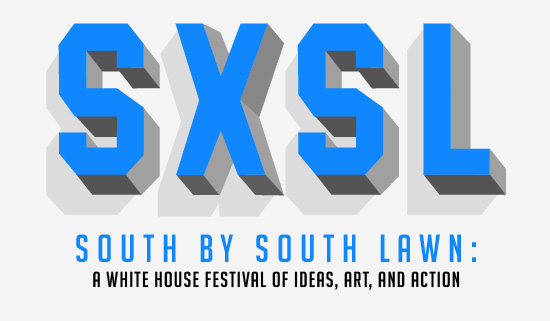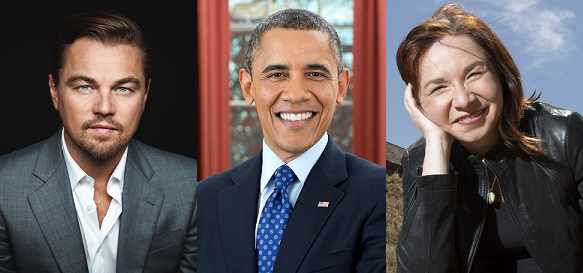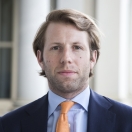

South by South Lawn, an event inspired by South by Southwest®, is bringing together creators, innovators, and organizers who work day in and day out to improve the lives of their fellow Americans and people around the world. Join the conversation on Monday, October 3 to be part of the discussion on how we can leverage what we know to create the change we want to see.
Alongside interactive booths on new technologies and innovations, don't miss the panel discussions throughout the day that will explore topics including Fixing Real Problems, Feeding the Future, LA: A Case Study in Innovation, and How We Make Change.
Here are the details:
President Obama in Conversation with Leonardo DiCaprio and Dr. Katharine Hayhoe
President Obama will join a conversation with Academy Award-winning actor Leonardo DiCaprio and climate scientist Dr. Katharine Hayhoe about the importance of protecting the one planet we’ve got for future generations.
Moderator
Leonardo DiCaprio is an Academy Award-winning actor, producer, and activist.
He founded the Leonardo DiCaprio Foundation in 1998 for biodiversity and habitat conservation, and climate change solutions. He is as a UN Messenger of Peace for Climate, and a recipient of the Clinton Global Citizen Award and the World Economic Forum Crystal Award. DiCaprio serves on the boards of World Wildlife Fund, Natural Resources Defense Council, National Geographic's Pristine Seas, Oceans 5, and International Fund for Animal Welfare.
Panelists
President Barack Obama is the 44th President of the United States.
Dr. Katharine Hayhoe is an accomplished climate scientist from Texas Tech University who has been named one of TIME’s 100 most influential people, Foreign Policy’s 100 global thinkers, and Politico’s 50 visionaries transforming American politics. Her new PBS Digital Studio series, Global Weirding: Climate, Religion and Politics, defies stereotypes about the politics of religion and science to explore the connection between our values and our response to our changing climate.

Breakfast Session at the Newseum
Hard Things are Hard: A Conversation with James Turrell and David Adjaye
On the President’s desk there’s a plaque that reads, “Hard things are hard.” For artist James Turrell and architect David Adjaye, taking on the hard work has motivated them to push physical limits, build audacious structures, and consistently challenge the standards of art and architecture. For over half a century, Turrell has worked with light and space to create works that challenge the limits of human perception. Since the late 1970s, he has been working on Roden Crater, a large-scale artwork created within a volcanic cinder cone in Northern Arizona. Adjaye, has designed innovative structures around the world including to London’s Rivington Place, the Nobel Peace Center in Norway, and D.C’s newest landmark, the National Museum of African American History and Culture. To kick-off SXSL, Turrell and Adjaye will discuss the challenges and rewards of taking on the “hard things” through their groundbreaking projects.
Fixing Real Problems
How can we harness technology to solve our biggest, most stubborn problems?
At South by Southwest earlier this year, President Obama called on the tech community to focus its attention on making America and the world more tolerant, fair, healthy, and full of opportunities. This panel will explore the work of entrepreneurs and social innovators who are leveraging new technologies to address some of our most critical challenges – and ask you to think about how you might lend your own time and efforts toward lasting change.
Moderator
Jenna Wortham is a staff writer for The New York Times Magazine where she writes on a wide range of topics, including technology and culture. She also co-hosts a podcast, “Still Processing,” with Wesley Morris.
Panelists
Stewart Butterfield is the co-founder and CEO of Slack, a messaging app for teams that’s used by 3 million people every day, including teams at eBay, Conde Nast, and Airbnb.
Stewart has built a distinguished career as a designer, entrepreneur, and technologist. He co-founded Flickr in 2003, was named one of the 100 Most Influential People in the World by Time Magazine and one of BusinessWeek's Top 50 Leaders, and has been featured in hundreds of publications including The Wall Street Journal, The New York Times, BBC, and the Financial Times.
Jukay Hsu is the founder of Coalition for Queens (C4Q), which creates pathways out of poverty through technology in the world’s most diverse community. C4Q increases graduate income from $18,000 to $85,000. After graduating from Harvard, he served in the U.S. Army and earned the Bronze Star medal in Iraq. He serves as Trustee of the Queens Public Library; Director of NYC & Company, New York City Water Board, and Friends of the Brooklyn Queens Connector.
Chris Redlitz is the Managing Partner of Transmedia Capital, a venture firm located in San Francisco. In 2010, Chris and his wife Beverly Parenti co-founded The Last Mile, a California based technology training program for incarcerated men and women, the most progressive prison training program in the United States. Their goal is to expand The Last Mile nationally within the next 5 years.
Nina Tandon is CEO and co-founder of EpiBone, the world’s first company growing living human bones for skeletal reconstruction. She is the co-author of Super Cells: Building with Biology, a book that explores the new frontier of biotech. Her PhD research focused on studying electrical signaling in the context of tissue engineering, and she has worked with cardiac, skin, bone, and neural tissue.

Feeding the Future
How will we sustainably feed ourselves in the coming decades?
Ballooning populations, evolving diets, and a changing climate present serious obstacles to our future food supply. This panel will introduce us to some of the people leading the charge to make food more accessible, sustainable, and healthy, as well as explore the role you can play to best prepare for the future of food in your own community.
Moderator
Danielle Gould is the founder of Food+Tech Connect, the site of record for the world’s largest community for food tech and innovation. Food+Tech Connect's newsletter, website, events and consulting help entrepreneurs, executives and investors transform the food industry. Since 2010, Danielle has been the leading voice for leveraging new technology, investment and business models to create a better food future. She is also a founding member of the Culinary Institute of America's Business Leadership Council, a member of the Google Innovation Lab For Food Experiences and mentor for AccelFoods and Food-X. In 2015, Danielle was named one of the 'Most Innovative Women in Food' by Fortune and Food & Wine Magazines.
Panelists
Will Allen is the founder and CEO of Growing Power, a not-for-profit center for urban agriculture training and building community food security systems. Growing Power is involved in more than 70 projects and outreach programs in Milwaukee, across the United States, and throughout the world. In 2008, Will was awarded the John D. and Katherine T. McArthur Foundation "Genius Grant" and named a McArthur Fellow.
Maria Rose Belding is a food insecurity researcher and writer currently serving as the co-founder and executive director of the MEANS Database, a nonprofit communications platform for food pantries and their donors in 46 states and D.C. Maria Rose is an undergraduate student in public health and pre-med at American University.
Caleb Harper is the principal investigator and director of the Open Agriculture Initiative (OpenAG) at the MIT Media Lab. Under his guidance, a diverse group of engineers, architects, urbanists, economists and plant scientists (what he calls an “anti-disciplinary group”) is developing an open-source agricultural hardware, software and data commons aiming to create a more agile, transparent and collaborative food system.
Nikiko Masumoto is a farmer on the Masumoto Family Farm. Born in the Central Valley of California, Nikiko spent her childhood slurping over-ripe peaches on her family’s 80-acre organic farm. She has never missed a summer harvest and now works full time on the farm. She returned to farm with degrees in Gender & Women’s Studies (UC Berkeley) and Performance as Public Practice (UT Austin). Her passion for arts and activism is woven with her love of the land and dreams of a sustainable future.

How We Make Change
What role do citizens have in bringing real and lasting change to our country?
“America is not the project of any one person,” President Obama said in Selma last year. “The single-most powerful word in our democracy is the word ‘We.’” Indeed, unelected citizens seeking change—people channeling the power of “We”—have been behind some of the biggest social and economic movements of the past eight years, from achieving landmark victories in the struggle for LGBT rights to shining a new light on the enduring struggle for civil rights. These agents of change have transformed hashtags into movements and delivered real progress in our society. Find out how they did it, and what you can do to bring about the change you want to see in the world.
Introducer
Representative John Lewis, often called “the conscience of the U.S. Congress,” represents Georgia’s 5th congressional district in the U.S. House of Representatives. He is Senior Chief Deputy Whip for the Democratic leadership, a senior member of the powerful Ways & Means committee and is a ranking member on the Oversight Subcommittee. His moral authority and leadership on the issues of human and civil rights, equal and environmental justice, and historic preservation are widely recognized. He is the recipient of many awards and honorary degrees. Earlier this year, he was granted the Liberty Medal by the American Constitution Center and in 2012 a Medal of Freedom by President Barack Obama.
Moderator
Anil Dash is an entrepreneur, activist and writer who advocates for a more humane, inclusive and ethical technology industry. He cofounded Makerbase, an online community for people who make apps and websites, and Activate, a boutique management consultancy which defines strategies for companies in media and technology. Anil serves as a board member for companies and non-profits aligned with his advocacy: Stack Overflow, Data & Society Research Institute, NY Tech Alliance, Cash Music, and the Lower East Side Girls Club. He also advises major startups and non-profits including Medium and DonorsChoose.
Panelists
Brittany Packnett is an educator and activist from St. Louis, MO. She has been a teacher, legislative advocate, education executive, and currently serves as Vice President of National Community Alliances at Teach For America, building the organization’s first-ever civil rights and equity agenda. Committed to ending injustice, Brittany is a protestor, sits on President Obama’s Task Force on 21st Century Policing, and co-founded Campaign Zero. She is one of TIME’s 12 New Faces of Black Leadership and one of Politico’s top 50 influencers of 2016.
Carmen Rojas is the CEO of The Workers Lab, an innovation lab that invests in entrepreneurs, community organizers, and technologists to develop new ways to build power for working people in the US. The Workers Lab invests capital, offers business development training, and connects ventures to a broad network of supporters. She has over 15 years’ experience working with organizations to test revenue models & exploring the range of capital vehicles that can scale power building. Carmen holds a Ph.D. in City and Regional Planning from the UC Berkeley and was a Fulbright Scholar.
Evan Wolfson was the founder and president of Freedom to Marry, the campaign that won marriage for same-sex couples in the U.S., and is widely considered the architect of the strategy that led to nationwide victory in 2015. Having achieved the goal he pursued for 32 years, Wolfson now advises and assists diverse movements and causes in the U.S. and globally, eager to adapt the model and apply the lessons that made the Freedom to Marry campaign so successful.

LA, a Case Study in Innovation
How do we foster innovation and collaboration in cities and local communities?
Los Angeles offers some good lessons. While the city owes part of its dynamism to the growing presence of new tech and media firms, its progress has been driven by leaders in non-profits, government, and social innovation working together to brighten the future for the City of Angels. Find out how they’re doing it, and get inspired to improve the dynamism and resilience in the community where you live.
Moderator
Jonathan Gold is the Pulitzer Prize-winning restaurant critic for the Los Angeles Times. He was formerly the critic at LA Weekly and Gourmet. He is also a regular on KCRW's Good Food radio program. Jonathan has a reputation for being a curious eater, and his portraits of restaurants off the beaten path have helped introduce Los Angelenos to new cultures and new cuisines.
Panelists
Yael Aflalo is the founder and CEO of Reformation, a leader in sustainable fashion. Yael began her career as a designer before going on to launch her first clothing line, Ya-Ya, in 1999. During her time at Ya-Ya, Yael took notice to the environmentally destructive norms of the fashion industry – from overprinting look books to overseas production. Yael is dedicated to transforming the prevailing, harmful retail practices of the fashion industry and is paving the path for how the fashion industry defines green.
Krisztina ‘Z’ Holly is an MIT-trained engineer and tech entrepreneur. She’s the host of The Art of Manufacturing podcast and Chief Instigator of LA Mayor Garcetti’s MAKE IT IN LA initiative. She created the first ever TEDx (TEDxUSC) and founded MIT and USC innovation centers that launched dozens of faculty startups. Her early startup days were at Stylus innovation (acquired by Artisoft), Direct Hit (Ask Jeeves) and Jeeves Solutions (Kanisa). She lives and plays in Los Angeles.
Oscar Menjivar is the founder and CEO of URBAN Teens Exploring Technology (URBAN TxT), a nonprofit organization that helps inner-city youth develop leadership, coding and entrepreneurial skills through the use of technology. Oscar’s work as a social innovator has put him at the intersection of technology and education, including work as a consultant for The Riordan Foundation advising school executives on how to implement technology in the classroom. Oscar received his Master’s degree from Pepperdine in learning technology and his Bachelor’s in Science in Computer Information Systems.
Brian Mullins has consistently been on the forefront of technology and is a pioneer in the field of Augmented Reality (AR), Human Machine Interface, and Computer Vision. Prior to DAQRI, Brian worked at the Computer-Aided Operational Research Facility operated by the U.S. Department of Transportation, and spent time as a consultant to the Space and Naval Warfare Systems Command in San Diego. Brian holds a Bachelor of Science from the United States Merchant Marine Academy.



